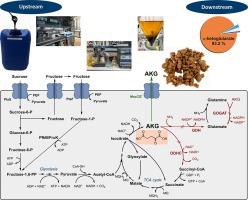From molasses to purified α-ketoglutarate with engineered Corynebacterium glutamicum
IF 9.7
1区 环境科学与生态学
Q1 AGRICULTURAL ENGINEERING
引用次数: 0
Abstract
α-ketoglutarate (AKG) is a valuable dicarboxylic acid with multiple applications in the food, pharmaceutical, and chemical industries. Its chemical synthesis is associated with toxic by-products, low specificity, and high energy input. To create a more environmentally friendly and sustainable alternative, a microbial production process for AKG was developed. Four potential producer strains were generated by metabolic engineering of Corynebacterium glutamicum and characterized on defined glucose/sucrose media as well as molasses, a side stream from sugar beet processing. While strain C. glutamicum PO6-iolT1 Δgdh ΔgltB mscCG’ ΔodhA was not able to grow on defined media it outperformed all predecessor variants on molasses. Successful scale-up into a fed-batch bioreactor process with molasses yielded 96.2 g AKG with a conversion yield of 0.64 g g−1. Finally, downstream processing by liquid–liquid extraction with ethyl acetate enabled product purification with an extraction efficiency of 87 % and an AKG purity of > 93 %.

利用工程化谷氨酸棒杆菌从糖蜜到纯化的 α-酮戊二酸。
α-酮戊二酸(AKG)是一种珍贵的二羧酸,在食品、制药和化工行业有多种用途。其化学合成过程中会产生有毒副产品、低专一性和高能耗。为了创造一种更环保、更可持续的替代品,我们开发了一种 AKG 微生物生产工艺。通过对谷氨酸棒杆菌(Corynebacteriumglutamicum)进行代谢工程改造,产生了四种潜在的生产菌株,并在特定的葡萄糖/蔗糖培养基以及甜菜加工过程中产生的副产品--糖蜜中进行了鉴定。虽然谷氨酸棒杆菌 PO6-iolT1 Δgdh ΔgltB mscCG' ΔodhA 菌株不能在确定的培养基上生长,但它在糖蜜上的表现优于所有前变种。在糖蜜的喂料批次生物反应器工艺中成功放大后,AKG 的产量为 96.2 克,转化率为 0.64 克-1。最后,通过乙酸乙酯液液萃取法进行下游处理,使产品得以纯化,萃取效率达到 87%,AKG 纯度大于 93%。
本文章由计算机程序翻译,如有差异,请以英文原文为准。
求助全文
约1分钟内获得全文
求助全文
来源期刊

Bioresource Technology
工程技术-能源与燃料
CiteScore
20.80
自引率
19.30%
发文量
2013
审稿时长
12 days
期刊介绍:
Bioresource Technology publishes original articles, review articles, case studies, and short communications covering the fundamentals, applications, and management of bioresource technology. The journal seeks to advance and disseminate knowledge across various areas related to biomass, biological waste treatment, bioenergy, biotransformations, bioresource systems analysis, and associated conversion or production technologies.
Topics include:
• Biofuels: liquid and gaseous biofuels production, modeling and economics
• Bioprocesses and bioproducts: biocatalysis and fermentations
• Biomass and feedstocks utilization: bioconversion of agro-industrial residues
• Environmental protection: biological waste treatment
• Thermochemical conversion of biomass: combustion, pyrolysis, gasification, catalysis.
 求助内容:
求助内容: 应助结果提醒方式:
应助结果提醒方式:


